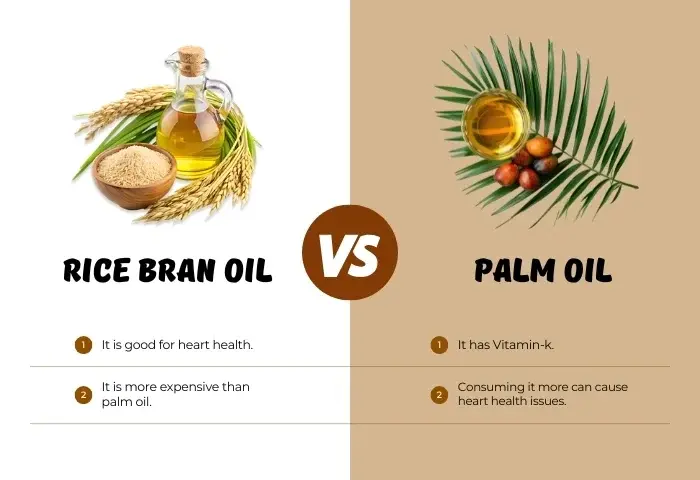Introduction:
When we are cooking, one of the main ingredients that we use while cooking is oil. But in this vast market, there are many oils to choose from, so which one is the best choice? Rice Bran oil has become famous recently for being a health-supporting oil in the market. But, for many years, people of so many countries have been using palm oil, so which one is the better choice: Rice Bran Oil or Palm Oil?
Difference between Rice Bran oil and Palm oil
Rice Bran oil: Rice Bran oil is made from the outer brown layer of the rice grain, known as the bran layer. This oil is new to the market as compared to Palm oil. But the health benefits and nutritional content of this oil have made it stand out in the oil market. Rice Bran oil also has different vitamins like Vitamin K, A, E, and D.
Palm oil: Palm oil is extracted from the palm fruit, which causes deforestation and habitat loss. Palm oil is used in most Indian households, making it very well-known in the Indian market. As compared to Rice Bran oil, Palm Oil is much cheaper. While the rice bran oil has many health benefits, palm oil provides a cheaper and neutral taste option.
Rice Bran Oil benefits
Rice bran oil is a rich source of fatty acids, including linoleic acid and alpha-linolenic acid (ALA). These fatty acids help in improving heart health, brain function, and skin health. Rice bran oil also contains vitamins like Vitamin K, A, E, and D, phytosterols, and plant-based compounds that can help lower cholesterol levels. It has a high smoke point. making it ideal for high-heat cooking such as frying, sautéing, and grilling. Rice bran oil can also be used as a finishing oil for salads and dressings.
Palm Oil benefits
Palm oil also has many benefits, including being a good source of vitamin K and beta-carotene, which act as antioxidants. Palm oil also contains tocotrienols, a form of vitamin E. These sources of antioxidants also help prevent aging and can help against diseases like cancer and arthritis.
Key differences in Nutritional value
Calories: Rice Bran oil and Palm oil both have the same amount of calories(884 calories per 100g).
Fats: As oil is the main source of fats, both oils have 100g of fat per 100g.
Saturated fats: Rice bran oil has 19g of saturated fat as compared to palm oil, which has 50g of Saturated fat per 100g, making it dangerous for our heart.
Monounsaturated Fat: Both Rice Bran oil and Palm oil have the same amount of Monounsaturated Fat, which is 40g per 100g.
Polyunsaturated Fat: Essential for various bodily functions, Polyunsaturated Fat is divided into omega-3 and omega-6 categories. Rice Bran oil contains 35g of Polyunsaturated Fat, while on the other hand, palm oil contains only 10g per 100g.
Tocopherol (Vitamin-E): Palm oil contains 15g of tocopherol, which is down by 19g as compared to Rice Bran oil, containing 34g of Tocopherol.
Vitamin K: Rice Bran oil contains 24.7 mcg, higher than palm oil, which has only 8 mcg of vitamin K.
Cholesterol: Both Rice Bran oil and Palm oil have 0g of cholesterol, which is an essential thing; however, palm oil sometimes increases blood cholesterol, which can affect the heart health of a person.
Smoke Point: Rice Bran oil and palm oil both have similar smoke points, being 232 °C for Rice Bran oil and 230 °C for Palm oil
Rice bran oil vs Palm oil: Best Uses for Cooking
Both oils can be used for various cooking methods, such as frying, sautéing, and baking. However, rice bran oil has a higher smoke point, making it suitable for high-heat cooking.
If you prefer a neutral-flavoured oil for cooking, palm oil might be a better choice. Rice bran oil gives a slightly nutty flavour, which may not be ideal for some people.
Rice Bran oil has a high smoke point, making it ideal for high-heat cooking such as frying, sautéing, and grilling. Rice bran oil can also be used as a finishing oil for salads and dressings.
Palm oil also has a high smoke point, which makes it suitable for various frying techniques, and its versatility allows it to be used in baking and other cooking methods.
Which Oil benefits you the most
As you would have guessed from reading the above information, Rice Bran Oil has many more health and overall benefits, like less Saturated fat or more vitamins and antioxidants, making it a healthier option for your heart health, skin health and brain functioning. Even though palm oil is cheaper, Rice Bran oil has many more benefits, making Rice Bran oil a better choice.
Conclusion: Rice Bran Oil VS Palm Oil
Both rice bran oil and palm oil offer unique characteristics and nutritional benefits. Rice bran oil is rich in Vitamins, unsaturated fatty acids and phytosterols, making it a heart-healthy choice. Palm oil contains tocotrienols, but its high saturated fat content and environmental concerns makes it harmful to the population.
FAQs Related to the Blog
1. What is the main difference between rice bran oil and palm oil?
Rice bran oil is extracted from the outer brown layer of rice grains, while palm oil is made from the fruit of the oil palm tree.
2. Which oil is healthier: rice bran oil or palm oil?
Rice bran oil is generally considered a healthier and better option due to its antioxidised content and higher levels of heart-friendly nutrients like vitamin E, phytosterols, and unsaturated fats.
3. Is rice bran oil better for heart health than palm oil?
Yes, rice bran oil contains less saturated fat and more unsaturated fats, making it more beneficial for heart health compared to palm oil.
4. Does palm oil have any health benefits?
Yes, palm oil is a source of antioxidants such as tocotrienols (a form of vitamin E) and beta-carotene, which can support skin health and reduce aging.
5. Can both oils be used for frying?
Yes, both oils have high smoke points (around 230–232°C), making them suitable for high-heat cooking like frying and sautéing.
6. Why is palm oil considered environmentally harmful?
Palm oil production often leads to deforestation, habitat loss, and biodiversity decline, especially in tropical regions.
7. Is rice bran oil more expensive than palm oil?
Yes, rice bran oil is typically more expensive due to its production process and nutritional value, while palm oil is more affordable and widely available.
8. Do either of the oils contain cholesterol?
No, both rice bran oil and palm oil are cholesterol-free. However, palm oil may raise blood cholesterol levels due to its high saturated fat content.
9. What vitamins are found in rice bran oil?
Rice bran oil is rich in vitamins A, D, E (tocopherol), and K, making it beneficial for various aspects of health, including skin, bone, and immune function.
10. Does rice bran oil have a strong flavor?
Rice bran oil has a mild, slightly nutty flavor, whereas palm oil has a more neutral taste, which may be preferred in certain dishes.

